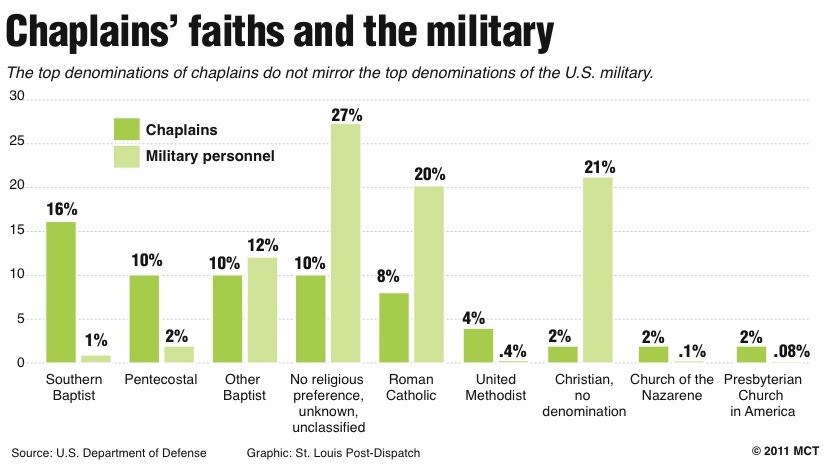ST. LOUIS – In the military, the chaplain serves as a religious leader and a listener — ideally one who can assist personnel of all faiths. A frequent refrain among chaplains is “chaplain to all, pastor to some.”
But according to Department of Defense data, the nation’s corps of chaplains leans heavily toward evangelical Christianity, failing to mirror the military it serves.
While just 3 percent of the military’s enlisted personnel and officers call themselves Southern Baptist, Pentecostal or a member of a denomination that’s part of the National Association of Evangelicals, 33 percent of chaplains in the military are members of one of those groups, according to Pentagon statistics.
And the disparity could widen.
Data from the Air Force indicate that 87 percent of those seeking to become chaplains are enrolled at evangelical divinity schools.
The discrepancy is the result of a number of variables, including an aversion by mainline Protestant and Catholic seminary leaders to participate in military culture after the Vietnam War; changes in the military’s chaplain staffing and education policies; and the popularity of online courses for chaplain candidates at evangelical seminaries.
Military officials point out that chaplains are trained to support troops of all faiths, regardless of their own religious affiliation.
“In these various roles, chaplains respect the rights of others to their own religious beliefs, including the right to hold no beliefs,” said Eileen Lainez, a Pentagon spokeswoman.
But liberal theologians and educators say the imbalance could compromise efforts to meet the spiritual needs of soldiers facing combat or the stresses of military life. And some critics go further, arguing that the military risks becoming a mission field for evangelical Christianity.
In response, Eden Theological Seminary in Webster Groves, Mo., is launching its own program to train chaplains. The school is a seminary of the United Church of Christ, which is among the more liberal mainline Christian denominations.
“There’s a vacuum,” said Eden’s president, the Rev. David Greenhaw. “And there’s a general sense here that it’s important to fill that vacuum.”
Send questions/comments to the editors.



Success. Please wait for the page to reload. If the page does not reload within 5 seconds, please refresh the page.
Enter your email and password to access comments.
Hi, to comment on stories you must . This profile is in addition to your subscription and website login.
Already have a commenting profile? .
Invalid username/password.
Please check your email to confirm and complete your registration.
Only subscribers are eligible to post comments. Please subscribe or login first for digital access. Here’s why.
Use the form below to reset your password. When you've submitted your account email, we will send an email with a reset code.